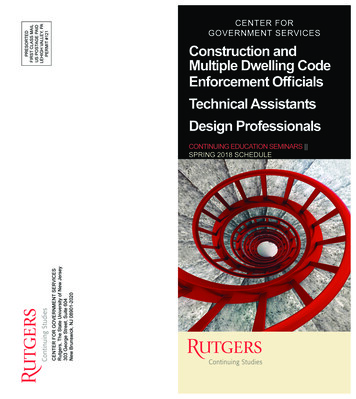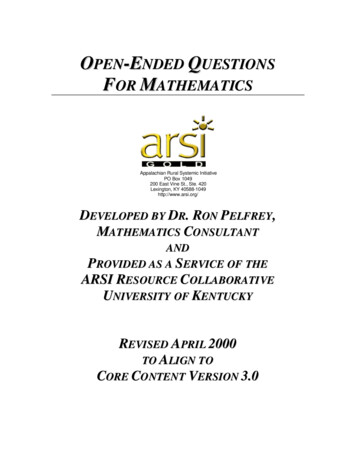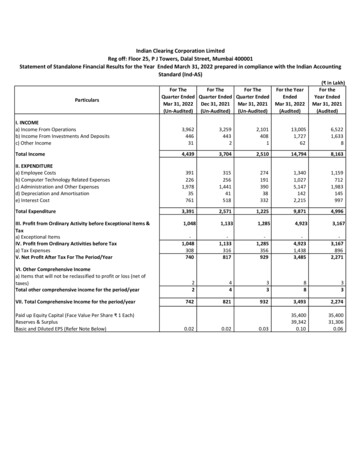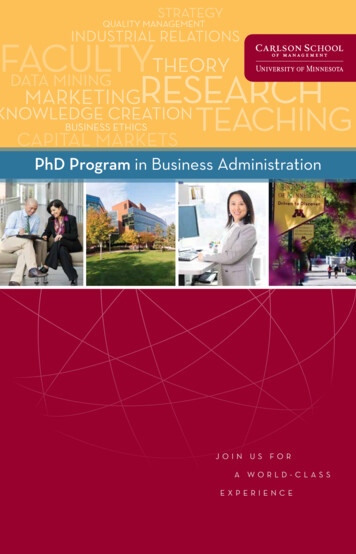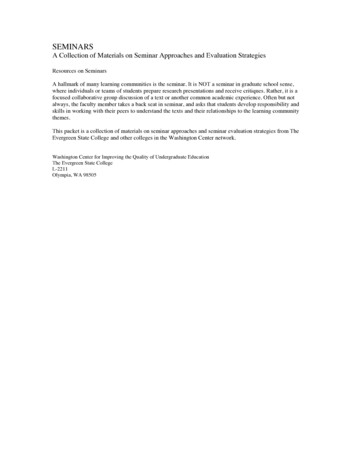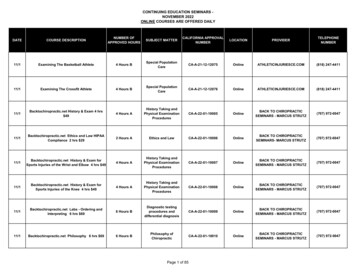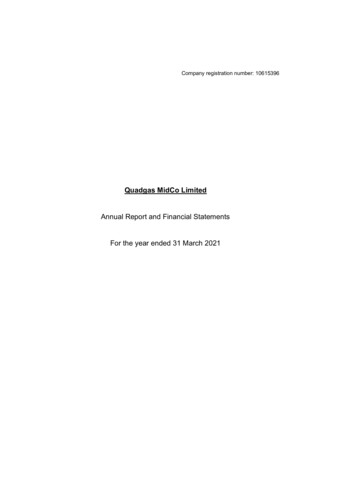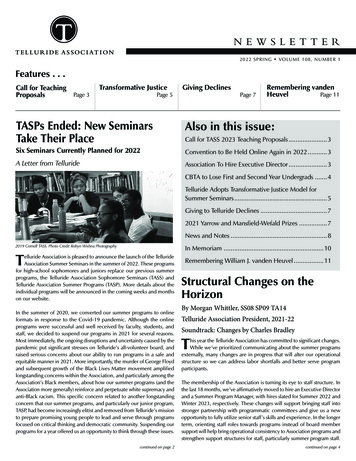
Transcription
NEWSLETTER2 0 2 2 S P R I NG V O LU ME 108, N UM BER 1Features . . .Call for TeachingProposalsPage 3Transformative JusticePage 5Giving DeclinesPage 7Remembering vandenHeuvelPage 11TASPs Ended: New SeminarsTake Their PlaceAlso in this issue:Six Seminars Currently Planned for 2022Convention to Be Held Online Again in 2022.3A Letter from TellurideAssociation To Hire Executive Director.3Call for TASS 2023 Teaching Proposals.3CBTA to Lose First and Second Year Undergrads.4Telluride Adopts Transformative Justice Model forSummer Seminars.5Giving to Telluride Declines.72021 Yarrow and Mansfield-Wefald Prizes.7News and Notes.82019 Cornell TASS. Photo Credit Robyn Wishna PhotographyIn Memoriam .10Telluride Association is pleased to announce the launch of the TellurideAssociation Summer Seminars in the summer of 2022. These programsfor high-school sophomores and juniors replace our previous summerprograms, the Telluride Association Sophomore Seminars (TASS) andTelluride Association Summer Programs (TASP). More details about theindividual programs will be announced in the coming weeks and monthson our website.In the summer of 2020, we converted our summer programs to onlineformats in response to the Covid-19 pandemic. Although the onlineprograms were successful and well received by faculty, students, andstaff, we decided to suspend our programs in 2021 for several reasons.Most immediately, the ongoing disruptions and uncertainty caused by thepandemic put significant stresses on Telluride’s all-volunteer board, andraised serious concerns about our ability to run programs in a safe andequitable manner in 2021. More importantly, the murder of George Floydand subsequent growth of the Black Lives Matter movement amplifiedlongstanding concerns within the Association, and particularly among theAssociation’s Black members, about how our summer programs (and theAssociation more generally) reinforce and perpetuate white supremacy andanti-Black racism. This specific concern related to another longstandingconcern that our summer programs, and particularly our junior program,TASP, had become increasingly elitist and removed from Telluride’s missionto prepare promising young people to lead and serve through programsfocused on critical thinking and democratic community. Suspending ourprograms for a year offered us an opportunity to think through these issues.continued on page 2Remembering William J. vanden Heuvel.11Structural Changes on theHorizonBy Morgan Whittler, SS08 SP09 TA14Telluride Association President, 2021-22Soundtrack: Changes by Charles BradleyThis year the Telluride Association has committed to significant changes.While we’ve prioritized communicating about the summer programsexternally, many changes are in progress that will alter our operationalstructure so we can address labor shortfalls and better serve programparticipants.The membership of the Association is turning its eye to staff structure. Inthe last 18 months, we’ve affirmatively moved to hire an Executive Directorand a Summer Program Manager, with hires slated for Summer 2022 andWinter 2023, respectively. These changes will support bringing staff intostronger partnership with programmatic committees and give us a newopportunity to fully utilize senior staff’s skills and experience. In the longerterm, orienting staff roles towards programs instead of board membersupport will help bring operational consistency to Association programs andstrengthen support structures for staff, particularly summer program staff.continued on page 4
TASPs Ended . . . continued from coverOver the past year, the Association conducted a thorough review of oursummer programs, investigating everything from student recruitment andseminar topics to faculty training and disciplinary procedures. We exploredhow these programs contribute to a culture of white supremacy by reviewingreports and feedback from the past decade of programs and interviewingrecent participants, staff, and faculty. We discussed the challenges ofcreating a Black-centered learning community in TASS, and the hierarchiesof age, race, and reputation that often emerged between TASS and TASP.We analyzed the limits of our ability to provide fair discipline to studentsat both programs, and particularly the disproportionate impact of ourdisciplinary procedures on students of color. We also reflected upon thetrends toward credentialism and academic elitism that our faculty havenoted in the past few years.Not everything has changed: both TASS-CBS and TASS-AOS will besix-week, residential seminars, free of charge, at Cornell, the Universityof Michigan, and the University of Maryland, College Park. We remaincommitted to the humanities and social sciences as useful academicframeworks for developing the skills of leadership, service, and criticalthinking that form the core of a Telluridean education. We will also continueto offer work-replacement and travel support to reduce financial barriersto participation.As a result of this first year of work to reimagine our high-school programming,the Association decided to recharter our summer programs to align themmore closely with our mission and with an explicit goal of combating racismand anti-Blackness. There are several pieces to this work: We are retiring the TASS and TASP names. Instead, we are offeringtwo new programs: Telluride Association Summer Seminar - CriticalBlack Studies (TASS-CBS), and Telluride Association Summer Seminar- Anti-Oppressive Studies (TASS-AOS). Both programs will be overseenby a single Telluride Association Summer Seminar Committee. TASS-CBS is an affirmation and extension of our commitment tocritical Black studies and the creation of Black learning communities.The program will place greater emphasis on the methods of CriticalBlack Studies, and focus more specifically on the needs and interestsof Black students. TASS-AOS will integrate the analysis of power, privilege, andoppression more thoroughly into the study of humanities andsocial science topics, and give students the tools to recognize andcritique the role of race and other forms of social difference in theircommunities. To eliminate the previous age hierarchy between TASS and TASP, wewill instead offer both TASS-CBS and TASS-AOS to both sophomoresand juniors. (We will separate grade levels within each program.) We have established new, more comprehensive learning outcomesfor both TASS-CBS and TASS-AOS that will guide our recruitment offaculty and seminar topics and form a basis for evaluating the successof our seminars. These learning outcomes aim to balance three areas:intellectual and academic skills, attention to race and other structuresof oppression, and the practice of democratic self-governance. We are revisiting our staffing structure to strengthen on-the-groundsupport for participants. We also plan to hire a dedicated summerprogram manager in 2022. We will implement a transformative justice approach to communitybuilding. We will continue to revise our recruitment and application processto reach students who might otherwise be unaware of our programsor disadvantaged in our application process.2TELLUR ID E N E W S L E T T E R2019 TASSers and Sunny. Photo Credit Vicky SwansonWe are excited to launch our new summer seminars for high school studentsin 2022. Over the coming year, we will continue to refine the goals andstructure of our new programs, and we expect that work to continue inthe years to come as we hire new staff and reflect on the first year of ournew programs. We recognize that these changes are only one step in thelonger project to address anti-Blackness within the Association, but webelieve that they are an important step in that direction.We are grateful for your support of Telluride Association over the years,and hope that you will continue to do so as we enter this new phase in ourhistory of offering transformative summer programs for high-school students.Sincerely,Morgan Whittler, PresidentMichael Thornton, Vice PresidentCandice Wang, Co-chair, Telluride Association Summer Seminar CommitteeCarlos Gemora, Co-chair, Telluride Association Summer Seminar CommitteeIsabella Grabski, Chair, Summer Program Review Working GroupTASS 2022 SeminarsTASS-Critical Black Studies: Black Freedom Beyond Borders (Cornell), Russell Rickford and Mukoma Wa Ngugi,Cornell University Artist as Activist: Black Literature and Visual Art in the 20th Century (Maryland),Jordana Saggese and GerShun Avilez, University of Maryland Black Geographies: Race, Place, and Space in Space (Michigan), Tasneem Siddiquiand James Pope, Winston-Salem State UniversityTASS-Anti Oppressive Studies: Imagining Better Futures (Cornell), Greg Londe, Cornell University, and WilliamBridges, University of Rochester Art at the End of the World: Crisis and Creation in the 1990s (Maryland), JakeyaCaruthers, Drexel University, and Isaiah Wooden, Brandeis University Race and the Limits of Law in America (Michigan), Vincent Lloyd and Dana Lloyd,Villanova UniversitySPRING 2022
Call for TASS 2023 TeachingProposalsConvention to Be Held OnlineAgain in 2022In summer 2023, Telluride Association plans to host programs in CriticalBlack Studies (TASS-CBS) and Anti-Oppressive Studies (TASS-AOS) atCornell University, the University of Michigan, and the University of Maryland.TASS seminars will run from late June to early August. More informationabout these programs can be found at www.tellurideassociation.org.Telluride Association is looking for faculty pairs who will collaborativelydesign and teach a challenging six-week seminar course for high schoolTASS students. Through topical exploration of their respective disciplines,faculty will introduce students to critical thinking and academic readingand writing. Applicants should have a track record of excellent teachingand either an advanced degree or a history of exemplary cultural work orintellectual production. Successful proposals often employ interdisciplinaryapproaches and creative pedagogical methods.Instructors work collaboratively with program counselors or “factotums,” whohelp prepare for seminars before the program and aid students with seminarreadings and assignments outside of class. Factotums also oversee all nonacademic aspects of the program and community, including facilitating andguiding the self-governance of the student participants. They are supervisedby the TASS committee and Telluride Association staff throughout the summer.Seminars meet five days a week from 9 am to 12 pm each day and shouldstrive to incorporate student discussion, faculty-led activities, studentpresentations, field trips, and skills workshops. Both members of hiredfaculty pairs are expected to attend each day of seminar throughout thecourse of the program.Please submit all of the following materials to teach.tass@tellurideassociation.org in PDF form by July 1st, 2022:1. CV from both instructors, including a complete list of courses taught orother pedagogical experiences.2. A joint teaching statement, including:- 300-600 words about your teaching philosophy, focusing on yourexperience and philosophy for teaching a classroom that is diversein race, gender, class, educational background, etc.- Short (200-300 words) narrative descriptions of 1-3 classes that youand your co-instructor are able to offer. Descriptions should include thecourse title, main themes, titles of 3-5 key readings, descriptions of 1-2assignments, and if applicable, a description of how community-basedlearning will be integrated into the class.If the committee finds a fit, we will contact you about arrangingan interview. Please direct any inquiries to the TASS Committee attass@tellurideassociation.org, or visit www.tellurideassociation.org formore information.Convention 2018, in less socially distant timesFor the third straight year, out of an abundance of caution regardingCOVID, Telluride’s annual Convention will be held again online thisJune. The annual June session is now the longest of Telluride’s newlyinstituted system of quarterly meetings of the membership. As is traditional,the summer meeting passes the annual budget, elects officers and newmembers, reviews the previous year’s programs, and plans for the comingprogram year. The other quarterly meetings, which generally are held ona weekend afternoon, focus more closely on specific programs like thesummer programs or Branches, or other important business includingpolicy review, budget adjustments, and more.Association To Hire ExecutiveDirectorAs we go to press, Telluride Association is actively conducting a searchfor the newly-created position of Executive Director. As the jobdescription states:Telluride Association seeks a collaborative and experienced leader whoshares our values of democratic self-governance, equity, service, andintellectual inquiry to step into the newly created role of Executive Director. Aqualified candidate will possess nonprofit, academic, or other organizationalleadership experience with a record of success in: supervision and mentorshipof in-person and remote staff; stewardship of donor and institutionalrelationships; and strategic planning and change management. Partneringwith individuals from a wide array of backgrounds, the Executive Directormust work to further racial equity and inclusion in all aspects of TellurideAssociation’s work. The ideal candidate will help drive organizational andprogrammatic changes currently in progress.The search process is currently underway, with plans to have the new hire inplace by June Convention. Please visit the Telluride website at oyment/ for more information.SPRING 2022TELLU RID E NEWSLETTER3
Structural Changes . . . continued from coverStaffing changes rightfully bring up several questions for TA members and,most generally, requires us to ask: what does it mean to be a TellurideAssociation board member? Where tradition dictates we are a workingboard with a hand in every level of program execution, Association life overthe last half-decade seems to push the definition of TA board membershiptoward a more traditional set of tasks: Defining organizational mission and values (the strategic plan initiative) Addressing operational shifts (Labor Working Group 2019-21) Financial oversight and education (the establishing of Finance and Budgetcommittee)The board has put significant resources (labor, money, and brainpower)toward these initiatives. Continued investment is essential to making TAboard membership more appealing and increasingly accessible in the future.Without a doubt, TA Board membership will retain its uniqueness (mostnotably its youth and mission focus as opposed to funding and fundraising).As we have always done, it remains necessary to focus our organizationalefforts and reflect on our institutional identity and values. This mission workwill help us navigate our present transition, narrow our focus to resourceour board and staff appropriately, and live out an intentional purpose. TheTelluride Association is already far from its founding roots in the wild westof early 20th century educational experiments in both time and place. Ourdemocratic practice demands that the board of the Telluride Associationconsistently determine the greater good and contribute to it as the currentbody sees fit. Currently, we are implementing these traditions by wrestlingwith these specific questions: What are we helping board members develop towards? What is thecourse of study for a TA board member? Can we create volunteer opportunities for TA alum that allow more alumto participate in our mission and benefit from development opportunities? How can our working board members collaborate and partner successfullywith TA staff? How can we operationalize anti-racist and racial equity practices in ouroperations and programs? What should our relationship to higher education be as the academiclandscape changes? How can we plan for that future? How can we better communicate with the wider TA community? In what ways can we better hold ourselves accountable for the workwe’ve chosen to do?In this COVID-era of Association work, it has become increasingly clear thataccountability can be a way to deepen community. We are engenderingthat by building up staff-board partnerships in programs; we are pulling foraccountability by investing time in our strategic plan; we are deepeningcommunity by holding quarterly meetings and sharing our goals externally-we’ve also expanded the ways we look to support the larger TA community,particularly BIPOC students who’ve attended our pre-2022 SophomoreProgram, by establishing the TADAS Scholarship fund. In that same spirit of4TELLUR ID E N E W S L E T T E Raccountability, I offer up topics the board will cover in quarterly meetingsthrough the end of the 21-22 TA year.1. Strategic plan revisions to include anti-racism2. Executive board roles3. Programmatic review processes, and4. Staff structureConversation appreciated. Commentary read. Advice accepted.CBTA to Lose First and SecondYear UndergradsLast year, CornellUniversityannounced that itwas instituting a newrequirement thatall first and secondyear undergraduatestudents live oncampus. CornellBranch has beeninformally exempt Cornell Branchfromsimilarrequirements thathave existed in the past regarding first year students, and the House haswelcomed many such students, particularly TASPers and TASSers preferredfrom our summer programs.Unfortunately, after a series of high-level discussions with Cornell in the fall,Telluride was unable to reach a satisfactory arrangement that could continuethis exemption. Thus, starting in Fall 2022, first and second year studentscannot live in Cornell Branch. Telluride is in touch with two incoming firstyears who had been offered scholarships, and both the House and theAssociation are contemplating ways to reach out to first and second yearstudents interested in Branch life. Although the number of such studentsliving at the House has been in decline in recent years, there is no doubtthat this will be an unfortunate loss for the Branch experience, as well asaffect post-summer program recruitment to Cornell and CBTA. Telluridewill continue to consider how best to adapt to these new circumstances,and readers are invited to contact Cornell Branch Committee chair atcbc@tellurideassociation.org if they have any thoughts.TELLURIDE ASSOCIATION NEWSLETTERThis publication is produced twice annually as a collaborativeproject between TA members, associates and staff.Submit news, letters, or comments to:Editor, Telluride Association,217 West Ave., Ithaca, NY 14850—or—news@tellurideassociation.orgManaging Editor: Matthew TrailInterim Administrative Director: Matthew TrailLayout & Production: Valerie McMillen, Arnold PrintingAdditional Contributors: Christopher Breiseth, Sohum Pal, MorganWhittler, Zoeey Wilkinson, Grace ZhangPrinted on recycled paper.SPRING 2022
Telluride Adopts Transformative Justice Model forSummer SeminarsBy Zoeey Wilkinson DS15 TA19, Sohum Pal SP15 TA19,and Grace Zhang, SS15 CB17 TA20, Factotum TrainingCommitteeIn July 2021, the membership of Telluride Association voted to adoptthe recommendation of the Summer Program Restructuring WorkingGroup that the Telluride Association Summer Seminars formally adopt atransformative justice framework as part of the community living pillar. Theseprinciples have been central to the Telluride summer program structureand training in the last several years, as outlined below.Transformative justice is “premised on the understanding that our workis not only about intervention in individual incidences of harm, but alsoabout transforming ‘the conditions of oppression and domination thatallow that violence to happen’ in the first place.”1 It is distinct from aconventional punitive approach in that the goal is not to punish personswho have inflicted harm. Transformative justice is distinct from restorativejustice (RJ) in that RJ designates projects that aim to “repair” harms orrelationships, without necessarily changing the conditions that makeharm possible. There is overlap between TJ and RJ practices, but thedistinction emphasizes transformative justice’s commitment to ending thecyclic violence that precipitates and accompanies traditional processes ofdiscipline and punishment.Recent summer programs have benefited from DEI (diversity, equity andinclusion) summer staff training in which summer staff learned techniquesused in restorative justice and transformative justice. However, in the past,TA has prioritized an approach to implementing the disciplinary policythat focuses on disciplining and punishing students. This implementationhas generated problematic outcomes, most significantly for Black studentsand other multiply-marginalized students. While we aim to retain theexisting disciplinary policy to align with best practices given our legalobligations in working with minors, we aim to supplement that policy andits implementation with transformative justice practices to mitigate theconditions that lead to harms requiring action under the Disciplinary Policy.Moreover, transformative justice presents a meaningful toolkit and frameworkfor students to co-create a self-governing, living learning experience.As typically implemented, the Summer Program Disciplinary Policy hasdealt with harm at an individual level and without accounting meaningfullyfor the fractures that create harm in our program communities.2 In thismodel, students who harm3 others may find their agency for transformingtheir own behaviors abridged. This approach is predicated on opaque andhierarchical decision-making. Punitive models foreclose the possibility ofaccountability and transformation.Importantly, the punitive model neglects the possibility that students can,with each other, co-create a Telluridean community that identifies andtransforms the structural logics and interpersonal behaviors advancingwhite supremacy, patriarchy, ableism, and classism (the logics that drivethe punitive approach). See example below:A fictional hypothetical informed by incidents at recent summer programsshows how summer program staff have implemented a restorative justiceapproach informed by the previous DEI factotum training materials. ItSPRING 2022also demonstrates the need to expand and implement transformativejustice in the summer programs:For a seminar project, one cisgender, heterosexual student was taskedwith playing a music video clip as part of a presentation. In the clip, themusical artist, also a cisgender heterosexual man, dressed in women’sclothing in attempt to “joke” and “mock”. This video had the effectof making humor through belittling transness, women and mockingthe seriousness of transphobic and gendered violence. Some studentsrecognized this and the room was silent after the clip played. The transstudents in the class did not speak for the remainder of the day’s seminar.After the seminar, some other cisgender students approached the studentwho played the clip. Leaning into early program DEI training material, theyinvited the student who played the clip to understand how the clip displayedtransphobic violence, and how it might impact and harm other communitymembers. The group continued to lunch, and the day continued. Onestudent spoke to both trans students to see what they thought about bringingit up at the nightly community meeting.In evening check-out (a practice the community decided on together), thecisgender students brought up the instance to “mark the moment.” They“marked” it as an instance of unintentional harm and explained how theclip relied on transphobic tropes for its humor. One trans student spokeabout how the clip made them feel hurt and angry. The student whoplayed the clip acknowledged that he made a mistake and hurt others inthe community, and thanked the students who raised the issue for takingtime to talk with and teach him something he did not realize.In this way, the student community implemented a response that prioritizedthe well-being of the harmed students, did not place responsibility forraising the issue on the shoulders of the harmed students and identifiedwhat needed to change in the dynamic of the group. Some of the harmedstudents used the space to speak about how they felt, and voiced trust intheir peers and community. The student who played the clip heard that hisbehavior was harmful to students in the group and affected the well-beingof the whole community. He learned how an “accidental mistake” wasconnected to broader social structures that enact transphobic harm, pain,and oppression, and was guided by the group toward changed behaviorand greater awareness.In an ideal transformative justice situation, the student who selected the clipwould have learned in advance of seminar, through training and familiaritywith power and privilege, to notice how the clip was transphobic aheadof time and chosen a different clip. This also could be an opportunity toself-reflect about why he was attracted to the transphobic clip. He couldhave carried this self-investigation to a peer (or factotum) about how wepeople become containers for and instruments of structural oppression.Additionally, the community might have used media/poems/articles toteach-in about transphobia, transliberation, harm reduction and howto implement in the TA community. They also might have checked-inemotionally as a group, attended to students’ experiences of harm, anddeveloped suggestions for how the community might better reduce harm,embrace well-being and continue. In this way, individual students andTELLU RID E NEWSLETTER5
community response shows everyone that harm reduction and the wellbeing of students, especially those of multiply-marginalized identities, isthe priority and responsibility of all.In instances of harm, accountability practice involves 4 steps: 1) selfreflection 2) apology 3) repair 4) changed behavior.4 Once an instanceof harm occurs, the community and the affected persons are involved inthis process.In the historical TA disciplinary model, this instance would likely have goneunaddressed, tacitly permitting a transphobic culture to take root in thesummer program. Escalating instances of transphobia may have eventuallyresulted in a more serious altercation and eventually a student may haveleft the program for disciplinary or well-being reasons. At this point, thedamage to community norms is so great that it is irreparable.Transformative justice steers student life back toward community, justiceand equity, rather than leaving multiply-marginalized students alone andunsupported unless/until the harm is “recognized” by the disciplinary policyas “worthy of intervention” by staff members.TASS has already used community meetings, call ins/outs, daily gatherings,discussions of the different axes of identity, power and privilege, and hurtcircles to maintain the health and well-being of participants in criticalBlack-centered communities. We plan to train factotums to extend theseand other transformative justice practices for both programs.The Summer Program Restructuring Working Group developed thisrecommendation after a year of soliciting feedback from membership,reviewing past programs, identifying what to change and conductingresearch about the best approach to implementation. In the coming yearthe Summer Seminar committees will work with external expert trainersto train summer and senior staff in the implementation of transformativejustice in our summer programs.As members, we are committed to developing the following, asrecommended by SPRWG: Recommendations (though not mandates) on exercises that candevelop a political analysis of power for students, helping to builda culture of safety and accountability among the summer programcohort. Strategies for conflict de-escalation that factota can implement inday-to-day life in the program, creating a program culture that is robustenough and flexible enough to sustain community accountabilitycircles. Clear, step-by-step guidance that will help factota and students facilitatecommunity accountability circles (with levels of factota involvementthat vary with the comfort of the students in facilitating those circles). 6These community accountability circles are consensus-based,consensual and voluntary exercises for encouraging persons whohave done harm to accept responsibility for harms they havecaused and commit to a concrete program of transformation (toa degree that is appropriate for the duration and scope of theprogram, at least).TELLUR ID E N E W S L E T T E R Accountability circles will be attuned to the roles of power—including how race, gender, class, sexuality, ability status, andother facets of identity must factor into processes for seekingaccountability. At a minimum, participants must feel physically safe enough toparticipate. We will be considering the following questions to thatend: what are the minimum conditions for using an accountabilitycircle? When an accountability circle is not appropriate, whatare the alternatives?We believe that transformative justice will help the Association renew itscommitment to fostering democratic community living, which has beenone of the hallmarks of a Telluridean education for decades.We encourage members, associates, and friends of the Association tooffer their feedback as we continue to develop the transformative justicecomponent of our summer programs. Don’t hesitate to contact us atfactotumtraining@tellurideassociation.org. We are excited for theAssociation to take this important step towards realizing our values in the21st century.Works cited1.Chen, Ching-In, Jai Dula
Candice Wang, Co-chair, Telluride Association Summer Seminar Committee Carlos Gemora, Co-chair, Telluride Association Summer Seminar Committee Isabella Grabski, Chair, Summer Program Review Working Group TASS 2022 Seminars TASS-Critical Black Studies: Black Freedom Beyond Borders (Cornell), Russell Rickford and Mukoma Wa Ngugi,
